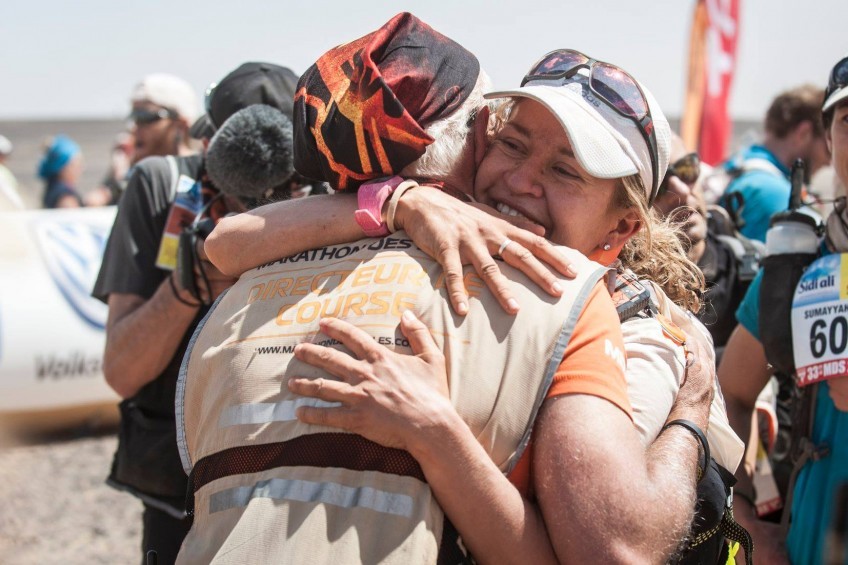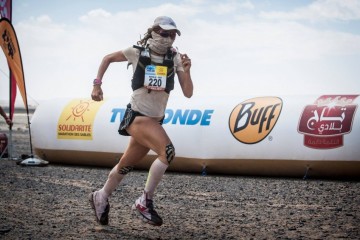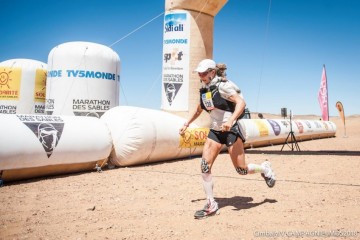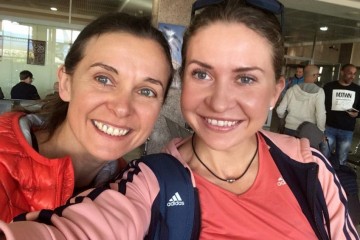Кликните на ссылку чтобы прочитать - РУССКОЯЗЫЧНУЮ ВЕРСИЮ.
Interview with Natalia Sedykh after Marathon des Sables - 2018.
TRAIL-RUN: Natasha, what emotions do you feel at the moment?
N.SEDYKH: I feel ethereal and joyous. I wouldn’t have expected such a reaction from myself, but it’s absolutely true! I think my long experience in sport has something to do with it. Unexpectedly, I got a taste of such emotional upheaval that it may mark the start of a new phase of my life. I feel no post-race depression. On the contrary, I am filled with inspiration and the desire to reach new heights! I got a very powerful shake-up, and not just from the unforeseen circumstances that I faced, but from the entire MDS journey.
Over the past year, I've feel like I’ve been jerked around in many different directions. I've been very busy with work and studies. It took a long time to diagnose and find the right treatment for a chronic injury. At the same time, my relationship began to push training into the background. At some point I realized that I was wearing myself thin and not quite certain about the path that I chose. I decided that I need a new serious test that will help me to filter out my priorities. So I registered for the Marathon des Sables. Yes, sometimes my actions do not have logical explanations. I often act upon my feelings. And now I'm 100% convinced that this approach is the right one! I feel a hurricane of energy and am ready to move forward to a new stage in my life.
TRAIL-RUN: Early in the race you received a one-hour penalty for lack of compulsory equipment, which lowered your ranking from first to fifth place. What happened? We have fragmentary information from the official statements by the race organizers and from Ian Corless. You were missing a whistle. How did that happen?
N.SEDYKH: I was running with a new model of a backpack. During the pre-race technical preparation day all equipment was checked meticulously. The whistle was integrated into the front shoulder strap, as it usually is. I am very familiar with all the rules of the race. And then at the finish line gear check - the whistle was gone! I have no explanation of how it happened. Did it fall off during the race? Probably. How? I have no idea. My take-away from this experience: next time, the whistle will be inside the backpack in a zipped pocket. The rest is unimportant. 60 minutes penalty.
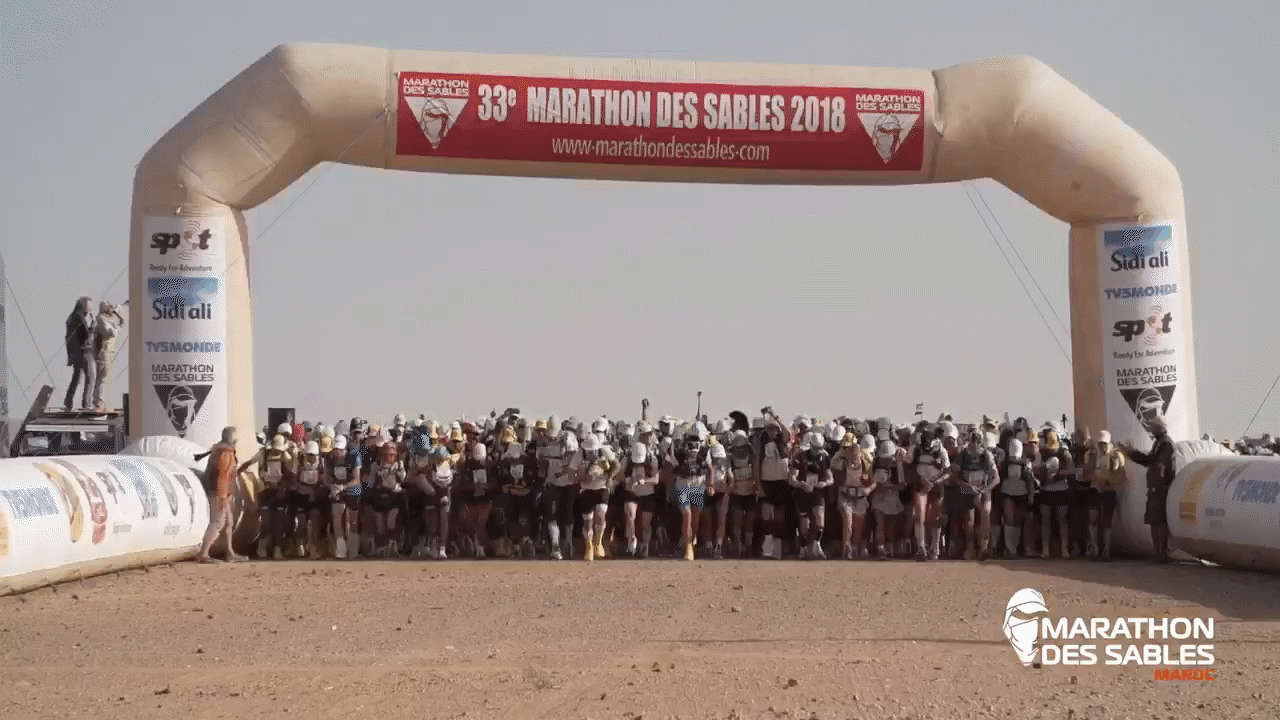
TRAIL-RUN: And how did you take it? What did you feel during that moment?
N.SEDYKH: Of course, this was not in the plans, but I did not lose heart, and calmly went on to plan "B"- to win back the penalty time. It seemed like it would be a difficult task, but not unrealistic. I felt no panic, just coolness and readiness for constructive action. I had a wonderful team, and they helped me maintain the right attitude. Later, I wrote a request to the race committee to reconsider dropping the penalty to 30 minutes, referring to the backpack model. I realized that the probability of success of that was quite low, but even if it was 1%, I had to try it.
TRAIL-RUN: Do you think the penalty was fair relative the magnitude of the offense?
N.SEDYKH: These are the rules of the race, which were known in advance, and I either accept them or I don’t, so there is nothing to evaluate. The race organizers have the right to determine the number of penalty minutes. I am impressed by the resoluteness and strictness of the committee; I myself am extremely meticulous to the smallest detail (as the athletes I coach can attest).

TRAIL-RUN: When you ran this race in 2015, you already encountered a similar situation. Then you took third place, again because of a time penalty for lack of compulsory equipment (200€). Is this so?
N.SEDYKH: In 2015 I traveled to the race as a tourist. I had no idea what it was, and I just wanted to see how I rank among the Russian team. Consequently, I was completely unaware of the seriousness of the technical preparation necessary for the race: equipment, food and so on. I did not have any experience in this kind of competitions, especially in international ones. The people who I traveled with during that trip were not serious athletes. Once again, we went there as tourists. I honestly admit that I have not read the rules then. I trusted the person who invited me there and just kept asking him. In addition, at the time my English was not very strong and I was just too lazy to translate everything.
In 2015, I had no high ambitions. I only started to feel a desire to perform well when I discovered that I was fourth among women. Only then did I actually start racing. So I simply removed the 200 Euros from my backpack on the eve before the start, because I was told that there is little chance that I would need them in the desert. At that time, finances were very tight and probably I was just afraid of losing a sum of money equivalent to my monthly salary. It was easier for me to leave the money in my luggage than to take it with me to the sands. And then, during the gear check it turned out that it was very much necessary, and it was a painful blow, since because of its absence, I could lose my podium position. But it's heaven and earth compared to how I feel about it now, so I think any comparison to 2015 is out of place.
TRAIL-RUN: How did the race develop after the penalty?
N.SEDYKH: The next two stages went really well. I felt well rested between the stages. The only concern was a growing weariness in the knees from the steep downhills. Yes, I realize that I did not train enough downhills while carrying a backpack. I could not find the time to travel from Dubai to the mountains because of a busy work schedule, so I did not devote enough attention to this. But this was not the main problem either. The flat sections I passed fairly painlessly.
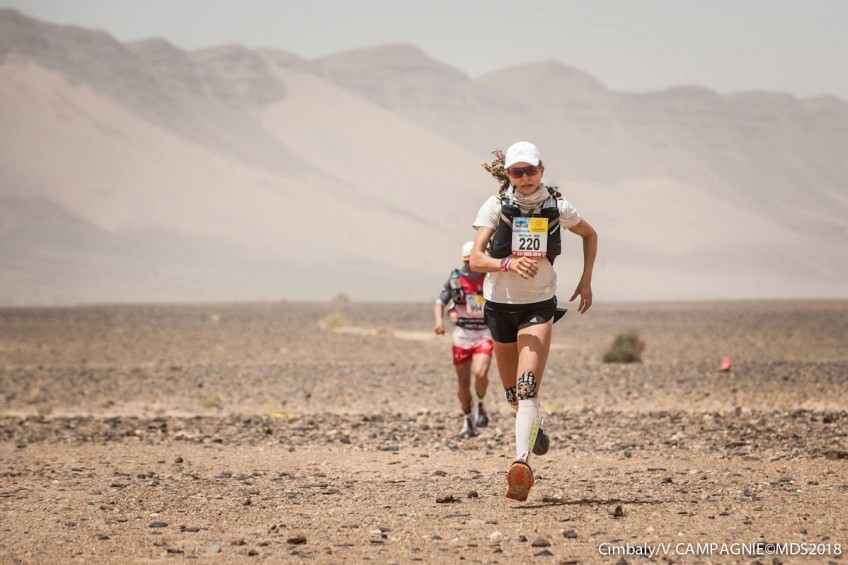
TRAIL-RUN: Then what was the main problem?
N.SEDYKH: I suspect the most likely culprit to be the drop in the iron levels in the blood. It is part of being a woman - I was not lucky with the days of the month. I tried to take some measures, but this did not save me.
TRAIL-RUN: It was clear to everyone – to us, to you, as well as your rivals – that the long stage will be the deciding one. There you finished 3 minutes behind 3rd place, and 40 minutes behind the leader Magdalena Boulet. During the first quarter you were leading the race, with a 3-minute lead over Boulet. Between KP2 and KP3 you had already lost 9 minutes to the leader. Then it only got worse. How did this stage evolve?
N.SEDYKH: The fourth day is the long stage. We started at 11AM, and at first I was running well, without much strain. After 27 km (between the 2nd and 3rd CP), it began to get very hot, but I do not blame the heat. This is exactly when I began to feel those "days". I was afraid that I would lose control if I kept running at the same intensity, so I decided to slow down the pace. As a result, I was forced to switch to walking, and just could not start again. I never got a second wind. My legs felt like they have been knocked out. When the heat died down, the storm and the dunes began, which required even more strength, and my engine was dead. The remaining 55 km of the long stage I covered with short running spurts, switching to a walk when I could not run, but I never stopped. Naturally, I finished during night much later than planned. Hungry and freezing.
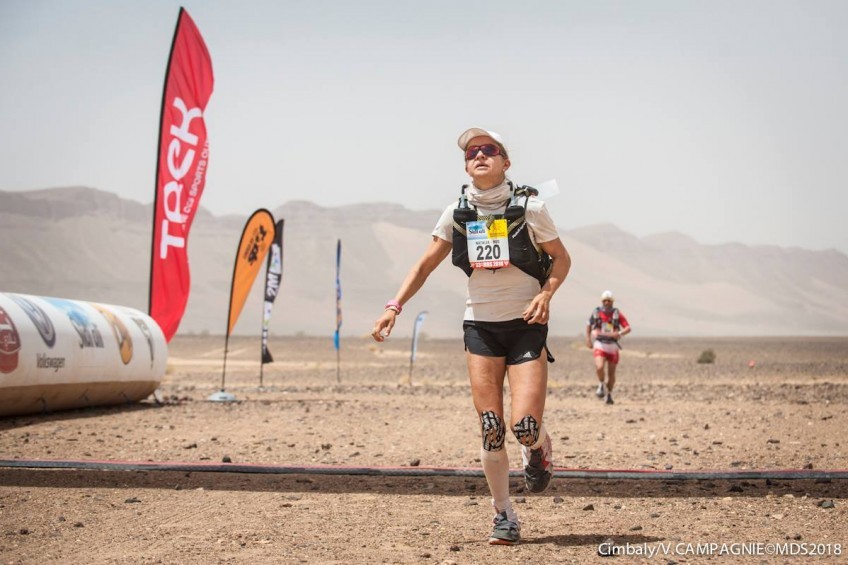
TRAIL-RUN: How did the race end?
N. SEDYKH: During the final marathon, my spark only lasted a short while - 6 km of trying to keep a competitive pace and I again began to "float". I had to focus on the track so I would not stumble. On the downhills my knees were already hurting so bad that I was seeing stars. What power helped me reach the finish line - I do not know. It also made me wonder what power helped propel stage after stage those who were under-trained, or those who injured their feet, with bleeding blisters, on the first day.
During the fifth stage, as I was struggling, I watched five women pass me without any effort. Their pace in the end was not fast at all, but I could not sustain even it as much as I tried. I had 20 km left in the race. So I ran according to how I felt, and did not try to compete. Again, I never stopped and passed the checkpoints as quickly as possible. As soon as the final camp appeared on the horizon, I estimated the remaining distance and terrain. There was no sand, and I had an opportunity to accelerate, and then I would be at the finish, even if I were dead as a result. I turned the engine on again and started to gain momentum. During this push, I was able to pass two women and finished in 4th place. However, then in the tent I fully collapsed. Andrei offered to take me to a doctor, but I refused. I went to lie down and made myself eat a little.
Yes, there was no victory this time. Nevertheless, my mood was on top. The atmosphere of the race and within my team were excellent, there was no way I could be depressed. In the evening I went to look for Magdalena Boulet, the winner of the race. Finally, the competition was over, we were again normal people and I was eager to talk to her and express my admiration. However competitive we may be out on the course, the kinship of our souls is undeniable. She met me with a kind smile and invited me to her tent. We had a very sincere chat, and embraced each other tightly, it was an unforgettable touching moment, I had to restrain tears of joy. I really value meeting people such as Magda, it is so inspiring for my own journey and development. Magda is 43 years old, she has a 12 year old son and her best marathon (2:26:22) she ran when she was already 37 years old! The beautiful Eriksen Bouchra (third place) has four children and yet she runs like a machine! I also talked with her, she told me that she forgot to bring gels for the long stage and drank only water, yet she persisted!
And I'm only 30 years old! And like never before, I feel like everything is still ahead of me.

Natalia Sedykh with Magdalena Boulet.
TRAIL-RUN: What conclusions do you make for yourself from this race?
N.SEDYKH: With Marathon des Sables, my story seems to be just beginning.
With age, our bodies become increasingly prone to injury. "Brilliant!", I thought to myself giving myself a powerful mental slap on the head. Of course, this is not news to me. However, after two years of "involuntary leave"I certainly felt the subtle changes in my body. I have plenty of strength left, and there will be even more of it. But it is important to pay attention to your body and adapt the training program in a timely manner.
As strange as it is, I feel no sadness. I needed a shake up and I got it! It is these incidents that push us into a new stage of development. The only thing I'm worried about are the failed expectations of all those who followed me. I am very sensitive and, as my friends say, have a heightened sense of social responsibility. Interviews and race reports help me express and convey my thoughts to those who believed in me. This is why I write them. For myself, everything is more than justifiable.
Sport is a game! And the MDS in particular, as a member of our team Aleksey Baboshin said ironically, is a game of "meaningless cruelty". On the way to the top there will be many confounding factors, including the most unexpected ones (ah, that damn whistle!). But one must be able to leave them in the past, accept the experience with grace and gratitude, and continue to move forward. Until you give up, you're still in the game!
TRAIL-RUN: What's next for you?
N.SEDYKH: Next, a new life! I have already quit my job and am now preparing to move to another country. Great changes are coming and I'm ready for them!
Translation - Elisaveta Ershova.
